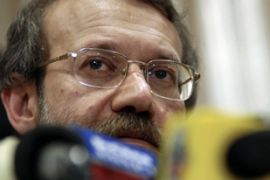Iran’s nuclear negotiator resigns
Ali Larijani to be succeeded by Saeed Jalili, deputy minister for EU and US affairs.

Elham did not give a specific reason for Larijani’s resignation other than to say he wanted to focus on “other political activities”.
The US and some of its allies accuse Iran of secretly trying to develop nuclear weapons. Iran has denied the claim, stating that its programme is for peaceful purposes including generating electricity.
Noted absence
Larijani’s absence during a meeting between Vladimir Putin, the Russian president, and Iran’s supreme leader, Ayatollah Ali Khamenei, last week raised eyebrows in Iranian political circles.
| Ali Larijani |
|
– Acting head of Revolutionary Guards in the 1980s – Served as minister of culture and Islamic Guidance – Remembered for heavy editing of foreign programmes as head of Iranian state radio and TV in 1994 – Ran as a presidential candidate in 2005 but got less than six per cent of vote – Appointed secretary of the Supreme National Security Council in 2005 |
Ahmadinejad had appointed Larijani, a former Revolutionary Guards commander and close ally of Khamenei, as the senior nuclear negotiator in August 2005 to replace Hasan Rowhani.
Ahmadinejad had accused Rowhani and his office of being weak and giving too many concessions to Europe in nuclear talks.
Before he was appointed, Larijani, 50, was the head of Iran’s state-run radio and television network and was seen as one of the most effective weapon in curtailing the plans of Mohammad Khatami, a former president.
In that postion, Larijani prohibited broadcasting information that might have been harmful to religious leaders and used state media to suppress democratic reforms.
After Larijani was appointed to the negotiator post, Iran took a more defiant approach to its nuclear programme.
Iran resumed uranium enrichment activities leading to its referral to the UN Security Council by the International Atomic Energy Agency in 2006.
Iran’s refusal to halt enrichment subsequently prompted a resolution by the UN Security Council which placed sanctions on Iran in December 2006. In March, another resolution widened sanctions on the country.
Firm position
Larijani held a firm position on controversial nuclear negotiations between Iran and the West.
In 2006, he rejected Western economic incentives in return for a suspension of Iran’s nuclear activities, saying the Security Council “should not think that they can make us happy with candies”.
 |
| Jalili recently accompanied the Iranian president on his trip to New York [AFP] |
Larijani is considered a more moderate figure than Ahmadinejad within Iran’s leadership.
He was seen to be more committed to a diplomatic solution over Iran’s nuclear programme, while Ahmadinejad has not favoured talks with the West.
Differences between Larijani and Ahmadinejad were revealed earlier this year when the president contradicted him on whether Iran would attend a meeting in Egypt to discuss Iraq.
Larijani travelled to Baghdad in May to discuss Iran’s conditions to attend the meeting, but was upset after a reporter at the Baghdad airport said Ahmadinejad had already confirmed that Iran would attend the meeting.
Larijani has a degree in mathematics and computer science as well as a PhD in philosophy.
Close ties
His replacement has close ties with the president and said in an interview with the semi-official Fars news agency in March 2007, that they “share the same views”.
Jalili was appointed deputy foreign minister in September 2005, just after Ahmadinejad took over as president and was a constant presence at the his side during his recent visit to New York to address the United Nations General Assembly.
He also attended the same university as Ahmadinejad, the University of Science and Industry in Tehran.
Mohhamad Sadegh al-Hosseini, a political analyst, said that the appointment was made to increase Ahmadinejad’s control over nuclear policy.
“It is a step towards consolidating the camp of Ahmadinejad and shutting the door to any kind of differences,” he said. “It is a prelude to the line-up of the upcoming parliamentary and presidential elections.”
